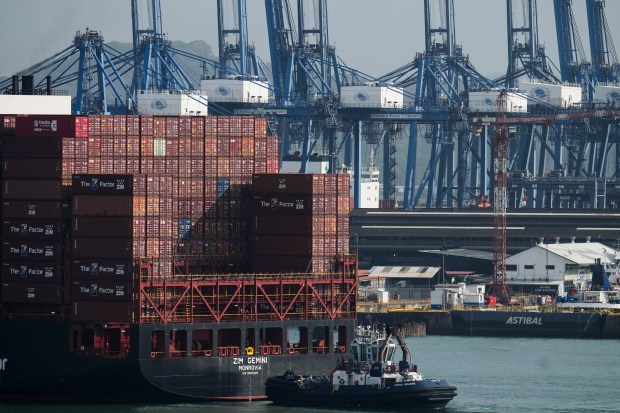Donald Trump has a special affinity for William McKinley, the former American president who was struck down by an assassin’s bullet in 1901, ending his second term before it really began. Trump has called his distant predecessor a “great but highly underrated” chief executive who made the United States wealthy by slapping tariffs on foreign goods. Whether or not this description is accurate, Trump genuinely believes it. Indeed, Trump feels so strongly about the man that he restored the name “Mount McKinley” to America’s highest peak during his first day in office.
Yet by the looks of it, Trump has more in common with another U.S. president who held court more than two centuries ago: James Monroe. While Monroe might not be in the same league as the George Washington’s and Abraham Lincoln’s of the world, he is best known for establishing the so-called Monroe Doctrine, which was designed to keep the Europeans out of the Western Hemisphere. The Monroe Doctrine has since been used as a shorthand for maintaining U.S. dominance in Latin America by ensuring no strategic competitors are able to get a permanent foothold in the region.
Trump, though, has taken the spirit of the Monroe Doctrine to the next level. He not only wants to keep China out; he aims to flaunt American power and coerce Washington’s allies and partners in the Western Hemisphere to meet his demands. The first two weeks of Trump’s presidency have been filled with bombastic threats of tariffs, sanctions and even military action if countries on the receiving end don’t submit. Whether it’s trying to convince Canada to become the 51st state, pressuring Denmark to sell Greenland to the United States or proclaiming that Panama Canal will soon be American property again, Trump’s browbeating has caused an immense amount of heartburn in the U.S. foreign policy establishment, which tends to view coercion over friendly states as bad optics and even worse policy.
But at the risk of stirring up a hornet’s nest, Trump’s tactics are actually working — so far. The tantrums on social media and stern, tough-guy prose from behind the resolute desk are getting results and moving various countries to cater to his whims or reassess their previous positions.
The examples are endless, even if Trump has only been in office for a few weeks. The most dramatic case study occurred this week, when Trump signed two executive orders instituting a tariff regime on goods entering the United States from Canada and Mexico in response to what the White House argues is an uncontrollable scourge of migrants and drugs coming from those countries. Canadian Prime Minister Justin Trudeau and Mexican President Claudia Sheinbaum denounced Trump’s tariffs and instituted equivalent tariffs of their own but also agreed to sit down with Trump to negotiate a way forward. The result was more patrols from Mexican and Canadian law enforcement along America’s southern and northern borders to combat fentanyl smuggling. Trump pocketed the concessions and agreed to suspend the tariffs for 30 days.
Mexico and Canada are hardly the only instances where Trump’s bullying tactics have gotten the other side to back down. Last week, after Colombian President Gustavo Petro refused to allow two U.S. military flights full of Colombian deportees to land, Trump blew a gasket and ordered his team to execute a 25% tax on Colombian goods entering the United States. Seeing that such measures would hurt the Colombian economy (the U.S. is Colombia’s largest trading partner), Petro backed down and agreed to take in the migrants. Trump crowed about it in public the next day.
Panama, too, is on the receiving end of Trump’s ire. Trump has long alleged that the strategic, man-made waterway linking the Atlantic and Pacific oceans is controlled by China, in violation of the 1977 treaty handing the canal over to Panama. In reality, Trump’s allegations are false. A Hong Kong-based firm does, however, operate two ports on each side of the canal.
While it’s difficult to believe Trump would order the 82nd Airborne to take back the Panama Canal by force, the Panamanian government appears sufficiently scared of the prospect and is thus willing to work with Washington on the issue. After Secretary of State Marco Rubio’s visit to the Central American country, Panamanian President José Raúl Mulino agreed to pull his country out of China’s Belt and Road infrastructure initiative earlier than anticipated and ordered an audit of the Hong Kong port operator. Rubio bragged about the deal as yet another early Trump administration foreign policy victory, although whether all of this will be enough to satisfy Trump is still in question.
The record, therefore, is that Trump’s preference for sticks over carrots is eliciting positive results for the United States — or at least results that make Trump look good.
Yet none of this should be misconstrued as an endorsement of Trump’s tactics. Sometimes tough-talk and coercion is necessary to attain foreign policy goals; it’s as natural in international relations as diplomacy, and frequently the two go hand-in-hand. But if not played properly, short-term gains could turn into long-term losses. Even small countries have their pride and domestic constituencies. Depending on Trump’s demands, even states that are traditional U.S. partners could conclude that signing any deals with the United States is a fool’s errand because, eventually, Trump will issue even stronger demands in the future. Others will try to balance against Washington by diversifying their foreign relations, finding alternative markets and perhaps even aligning closer to China, which is all too eager to expand its own power and influence to the detriment of its rival.
Trump’s tactics are working right now. The question is whether he is cognizant of the risks.
Daniel DePetris is a fellow at Defense Priorities and a foreign affairs columnist for the Chicago Tribune.
Submit a letter, of no more than 400 words, to the editor here or email letters@chicagotribune.com.



